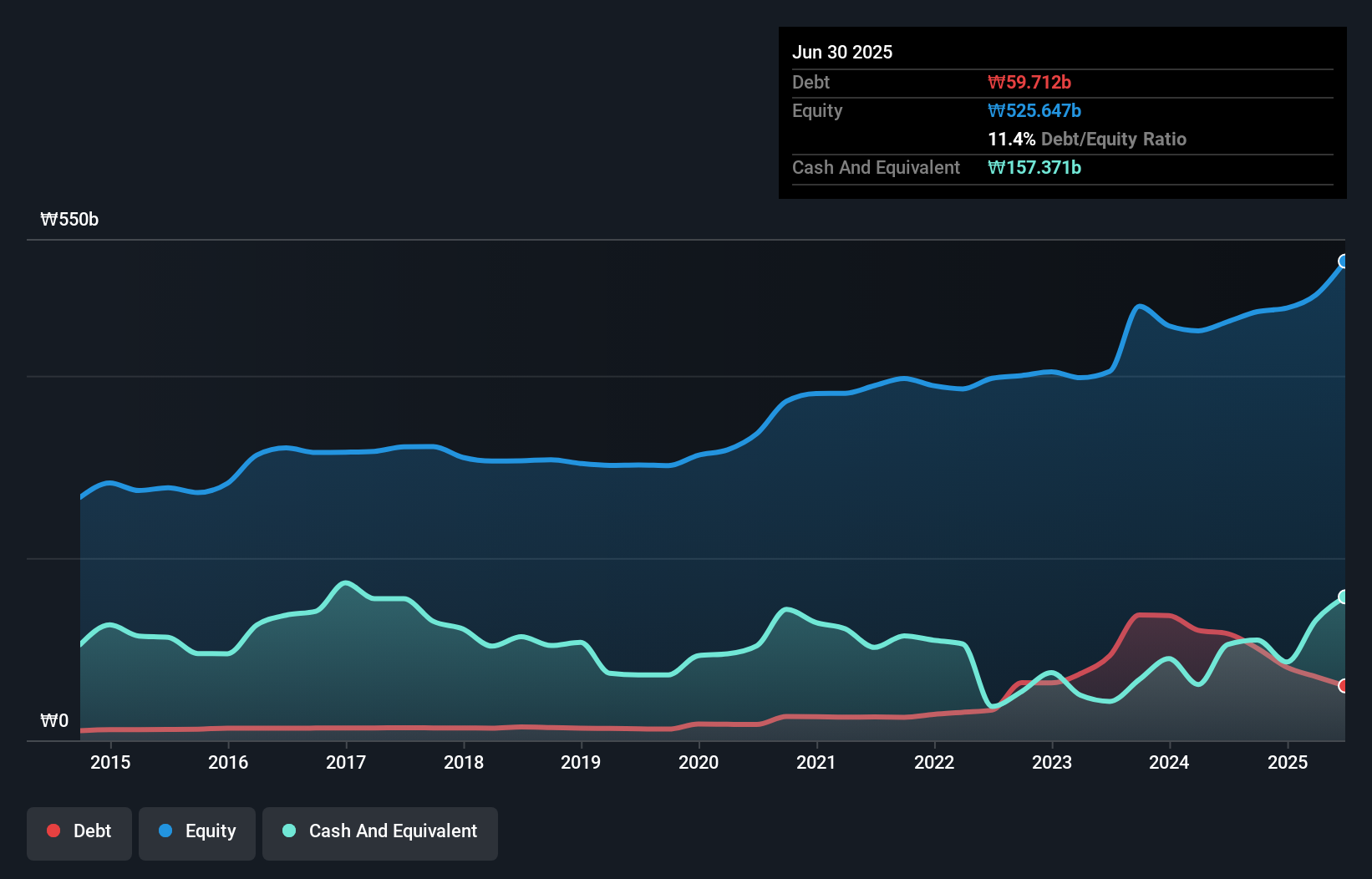Howard Marks put it nicely when he said that, rather than worrying about share price volatility, 'The possibility of permanent loss is the risk I worry about... and every practical investor I know worries about.' So it might be obvious that you need to consider debt, when you think about how risky any given stock is, because too much debt can sink a company. We can see that Hankuk Carbon Co., Ltd. (KRX:017960) does use debt in its business. But the more important question is: how much risk is that debt creating?
When Is Debt A Problem?
Debt is a tool to help businesses grow, but if a business is incapable of paying off its lenders, then it exists at their mercy. Part and parcel of capitalism is the process of 'creative destruction' where failed businesses are mercilessly liquidated by their bankers. However, a more usual (but still expensive) situation is where a company must dilute shareholders at a cheap share price simply to get debt under control. By replacing dilution, though, debt can be an extremely good tool for businesses that need capital to invest in growth at high rates of return. When we think about a company's use of debt, we first look at cash and debt together.
What Is Hankuk Carbon's Debt?
As you can see below, Hankuk Carbon had ₩59.7b of debt at June 2025, down from ₩117.0b a year prior. But on the other hand it also has ₩157.4b in cash, leading to a ₩97.7b net cash position.

How Healthy Is Hankuk Carbon's Balance Sheet?
We can see from the most recent balance sheet that Hankuk Carbon had liabilities of ₩360.1b falling due within a year, and liabilities of ₩45.7b due beyond that. Offsetting these obligations, it had cash of ₩157.4b as well as receivables valued at ₩123.1b due within 12 months. So it has liabilities totalling ₩125.3b more than its cash and near-term receivables, combined.
Of course, Hankuk Carbon has a market capitalization of ₩1.58t, so these liabilities are probably manageable. However, we do think it is worth keeping an eye on its balance sheet strength, as it may change over time. While it does have liabilities worth noting, Hankuk Carbon also has more cash than debt, so we're pretty confident it can manage its debt safely.
View our latest analysis for Hankuk Carbon
Better yet, Hankuk Carbon grew its EBIT by 247% last year, which is an impressive improvement. If maintained that growth will make the debt even more manageable in the years ahead. When analysing debt levels, the balance sheet is the obvious place to start. But it is future earnings, more than anything, that will determine Hankuk Carbon's ability to maintain a healthy balance sheet going forward. So if you want to see what the professionals think, you might find this free report on analyst profit forecasts to be interesting.
Finally, while the tax-man may adore accounting profits, lenders only accept cold hard cash. While Hankuk Carbon has net cash on its balance sheet, it's still worth taking a look at its ability to convert earnings before interest and tax (EBIT) to free cash flow, to help us understand how quickly it is building (or eroding) that cash balance. Happily for any shareholders, Hankuk Carbon actually produced more free cash flow than EBIT over the last three years. That sort of strong cash generation warms our hearts like a puppy in a bumblebee suit.
Summing Up
While it is always sensible to look at a company's total liabilities, it is very reassuring that Hankuk Carbon has ₩97.7b in net cash. And it impressed us with free cash flow of ₩91b, being 112% of its EBIT. So is Hankuk Carbon's debt a risk? It doesn't seem so to us. Above most other metrics, we think its important to track how fast earnings per share is growing, if at all. If you've also come to that realization, you're in luck, because today you can view this interactive graph of Hankuk Carbon's earnings per share history for free.
At the end of the day, it's often better to focus on companies that are free from net debt. You can access our special list of such companies (all with a track record of profit growth). It's free.
Valuation is complex, but we're here to simplify it.
Discover if Hankuk Carbon might be undervalued or overvalued with our detailed analysis, featuring fair value estimates, potential risks, dividends, insider trades, and its financial condition.
Access Free AnalysisHave feedback on this article? Concerned about the content? Get in touch with us directly. Alternatively, email editorial-team (at) simplywallst.com.
This article by Simply Wall St is general in nature. We provide commentary based on historical data and analyst forecasts only using an unbiased methodology and our articles are not intended to be financial advice. It does not constitute a recommendation to buy or sell any stock, and does not take account of your objectives, or your financial situation. We aim to bring you long-term focused analysis driven by fundamental data. Note that our analysis may not factor in the latest price-sensitive company announcements or qualitative material. Simply Wall St has no position in any stocks mentioned.
About KOSE:A017960
Hankuk Carbon
Produces and sells carbon fiber, synthetic resin, and glass paper related products in South Korea.
Excellent balance sheet with questionable track record.
Market Insights
Community Narratives





